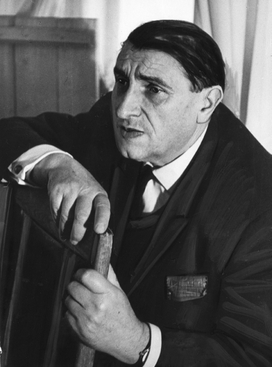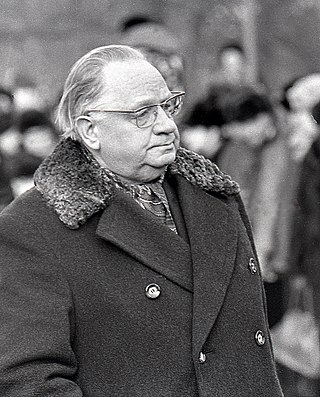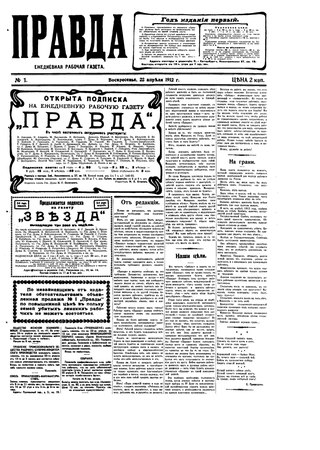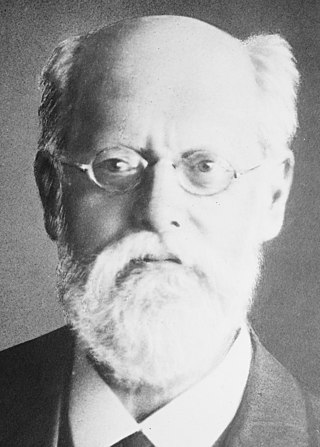
Nikolai Ivanovich Bukharin was a Russian revolutionary, Soviet politician, and Marxist theorist. A prominent Bolshevik described by Vladimir Lenin as a "most valuable and major theorist" of the Communist Party, Bukharin was active in the Soviet leadership from 1917 to his purge in the 1930s.

Imre Nagy was a Hungarian communist politician who served as Chairman of the Council of Ministers of the Hungarian People's Republic from 1953 to 1955. In 1956 Nagy became leader of the Hungarian Revolution of 1956 against the Soviet-backed government, for which he was sentenced to death and executed two years later. He was not related to previous agrarianist Prime Minister Ferenc Nagy.

The Stakhanovite movement was a mass cultural movement of workers which originated in the Soviet Union, and encouraged socialist emulation and rationalization of workplace processes. The Stakhanovites modeled themselves after Alexei Stakhanov, a coal miner, and took pride in their ability to produce more than was required by working harder and more efficiently, thus contributing to the common good and strengthening the socialist state. The movement began in the coal industry but later spread to many other industries in the Soviet Union. Initially popular, it eventually encountered resistance as the increased productivity led to increased demands on workers.

Nikolay Nikolayevich Krestinsky was a Soviet Bolshevik revolutionary and politician who served as the Responsible Secretary of the Communist Party of the Soviet Union.
The history of Russian animation is the visual art form produced by Russian animation makers. As most of Russia's production of animation for cinema and television were created during Soviet times, it may also be referred to some extent as the history of Soviet animation. It remains a nearly unexplored field in film theory and history outside Russia.

Ivan Petrovich Ivanov-Vano, born Ivanov, was a Soviet and Russian animation director, animator, screenwriter, educator, professor at Gerasimov Institute of Cinematography (VGIK). One of the pioneers of the Soviet animation school, he is sometimes called the "Patriarch of Soviet animation". People's Artist of the USSR (1985).

Anton Semyonovich Makarenko, was a Soviet educator, social worker and writer. He became the most influential educational theorist in the Soviet Union; along with promoting principles in educational theory and practice. As one of the founders of Soviet pedagogy, he elaborated the theory and methodology of upbringing in self-governing child collectives and introduced the concept of productive labor into the educational system. Makarenko's books have appeared in many countries.

Mikhail Nikolayevich Pokrovsky was a Russian Marxist historian, revolutionary and a Soviet public and political figure. One of the earliest professionally trained historians to join the Russian revolutionary movement, Pokrovsky is regarded as the most influential Soviet historian of the 1920s and was known as “the head of the Marxist historical school in the USSR”.

Johannes Käbin, also known by his Russified name Ivan Gustavovich Kebin, was an Estonian Soviet politician who led the Communist Party of Estonia from 1950 to 1978. Käbin was an ethnic Estonian but had been raised in Russia, as his family had moved to Saint Petersburg in 1910. After Estonia regained its independence until his death, Käbin was a member of the Social Democratic Labour Party.

Propaganda in the Soviet Union was the practice of state-directed communication aimed at promoting class conflict, proletarian internationalism, the goals of the Communist Party of the Soviet Union, and the party itself.
Alexander Rabinowitch is an American historian. He is Professor Emeritus of History at the Indiana University Bloomington, where he taught from 1968 until 1999, and Affiliated Research Scholar at the St. Petersburg Institute of History, Russian Academy of Sciences, since 2013. He is recognized internationally as a leading expert on the Bolsheviks, the Russian Revolution of 1917, and the Russian Civil War.
Boris Sergeyevich Sokolov was a Russian geologist and paleontologist. Sokolov authored reference works on the stratigraphy of Eastern Europe, in particular the fossil coral records, and created the concept of Vendian period, currently recognized as largely overlapping, but not fully equivalent to Ediacaran.

Merle Fainsod was an American political scientist best known for his work on public administration and as a scholar of the Soviet Union. His books Smolensk under Soviet Rule, based on documents captured by the German Army during World War II, and How Russia is Ruled helped form the basis of American study of the Soviet Union, and established him "as a leading political scientist of the Soviet Union." Fainsod is also remembered for his work in the Office of Price Administration and as the director of the Harvard University Library.
Richard Stites was a historian of Russian culture and professor of history at Georgetown University, famed for "landmark work on the Russian women’s movement and in numerous articles and books on Russian and Soviet mass culture."

The Malachite Box or The Malachite Casket is a book of fairy tales and folk tales of the Ural region of Russia compiled by Pavel Bazhov and published from 1936 to 1945. It is written in contemporary language and blends elements of everyday life with fantastic characters. It was awarded the Stalin prize in 1942. Bazhov's stories are based on the oral lore of the miners and gold prospectors.

Ivan Sergeevich Sokolov-Mikitov was a Russian/Soviet writer and journalist who took part in numerous journeys and expeditions. Sokolov-Mikitov, best known for his engaging traveller's sketches, was also regarded as a fine nature-observing stylist, in the line of Konstantin Paustovsky and Mikhail Prishvin. Following the tradition of Russian realism, but still influenced by 1900s modernist authors, Sokolov-Mikitov developed his individual style of writing, incorporating elements of traditional Russian folk tales, bylinas and fables. Autobiographical novel Childhood (1931) is regarded as one of his finest.

Folklore of Russia is folklore of Russians and other ethnic groups of Russia.

Pravda is a Russian broadsheet newspaper, and was the official newspaper of the Central Committee of the Communist Party of the Soviet Union, when it was one of the most influential papers in the country with a circulation of 11 million. The newspaper began publication on 5 May 1912 in the Russian Empire, but was already extant abroad in January 1911. It emerged as the leading government newspaper of the Soviet Union after the October Revolution. The newspaper was an organ of the Central Committee of the CPSU between 1912 and 1991.

Karl Johann Kautsky was a Czech-Austrian philosopher, journalist, and Marxist theorist. A leading theorist of the Social Democratic Party of Germany (SPD) and the Second International, Kautsky advocated orthodox Marxism, which emphasized the scientific, materialist, and determinist character of Karl Marx's work. This interpretation dominated European Marxism for two decades, from the death of Friedrich Engels in 1895 to the outbreak of World War I in 1914.
Eugene Nikolayevich Sokolov, also known as Evgeny Nikolaevich Sokolow, Evgeny Nikolaevich Sokolov, Evgeni Sokolov, Ye. N. Sokolov, Evgeniĭ Sokolov, Yevgeny Nikolaevich Sokolov, and Yevgeniy Nikolaevich Sokolov, was a Russian researcher specialized in the field of neuroscience who worked at Moscow State University and founded the Soviet psychophysiology research. He is best known for his work on the orienting reflex and habituation. He authored Orienting Response Information on this subject.














